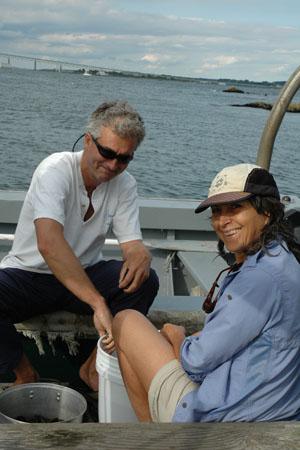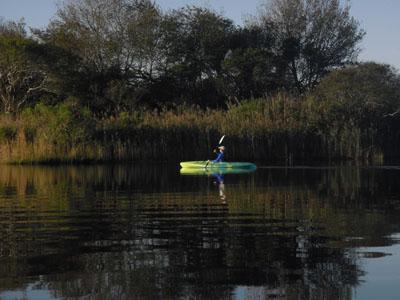Meet EPA Natural Resource Economist Marisa Mazzotta, Ph.D.

Putting a Value on Natural Resources
Marisa Mazzotta, Ph.D., has 17 years of experience in the field of Environmental & Natural Resource Economics, as an analyst, researcher, writer, and educator. She currently works as an Economist at EPA's Atlantic Ecology Division. Her research focuses on the public's valuation and prioritization of natural resources, the mapping and monitoring of ecosystem services, and the relationship between ecological changes and economic benefits.
How does your science matter?
I’ve recently completed two projects where I compiled and statistically analyzed data from existing studies, what we call “meta-analyses”. In one, I looked at how green spaces affect property values, and in the other how coal mining in West Virginia may affect the value of local recreational fishing, using ecologists’ predictions of how coal mining will affect fish abundance.
Additionally, I’m developing an approach to help decision makers at the local, state and watershed levels to prioritize wetland and river and stream bank restoration projects. Our focus is on evaluating the benefits− what we call “ecosystems services”− of these areas, such as reduced risks from flooding, urban open space, and improved water quality for drinking or recreation. We are currently working in the Woonasquatucket Watershed, an urbanized area in Rhode Island.
In the near future I’ll be looking at the urban areas at the head of the Narragansett Bay Estuary, where I will be devising methods to gather data on current and potential recreational uses and their values. I hope that our work will help decision makers better understand the tradeoffs that they’re making and how the choices they make today affect both ecology and what people value as important.
If you could have dinner with any scientist, past or present, who would it be and what would you like to ask him or her?
I’d like to meet Sylvia Earle, an American oceanographer, because I think she has had a fascinating life and career, and because she speaks so eloquently and beautifully about the ocean. Also, she seems like a warm and interesting person. I would ask her about her vision for the ocean and our relationship with it. I would also ask about what it’s like to be in the deep ocean and how that has affected her life on land.
When did you first know you wanted to pursue science?
At first, I thought I wanted to be an oceanographer. After taking some science courses—the hard sciences—I realized that was not for me. Since I was kind of mathematically oriented, economics made sense instead, but that was the late 70s. At that time people who wanted to study economics went to business school or they went into investment banking and similar areas, but that did not interest me.
Then I discovered environmental economics and natural resource economics. I could use my background to combine the different interests that I had—the environment and the ocean and coasts, paired with economics.

If you were not a scientist, what do you think you would be doing?
I would be growing vegetables, or participating in our local food movement. There is a ton of that going on here in Rhode Island. I love being outside and I love being in the dirt. And food! I love being able to go out to the front yard and pick a bunch of stuff to make dinner.
Tell us about your background.
After growing up in Connecticut, I moved to Rhode Island to study at Brown, and I've been here ever since. I did my graduate work at the University of Rhode Island, and my dissertation work was a really fun project out on the east end of Long Island for the Peconic Estuary Program. It was a survey of people's values for restoration or protection of different resources. It included wetlands, eelgrass, shellfishing areas, and farmland. I've used some of the information from that study on some preliminary work related to Narragansett Bay and people's uses and preferences related to clean water.
Do you have any advice for students considering a career in science?
I advise economics or other social science students to take some ecology or other science courses (and vice versa), because one of the big things is communication across disciplines. We have different languages and different ways of looking at things.
I also suggest studying Geographic Information System (GIS). More and more of what we’re doing is looking at how people and ecosystem services are distributed across the landscape, how they move across the landscape, and how land uses change the provision of ecosystem services and values.
